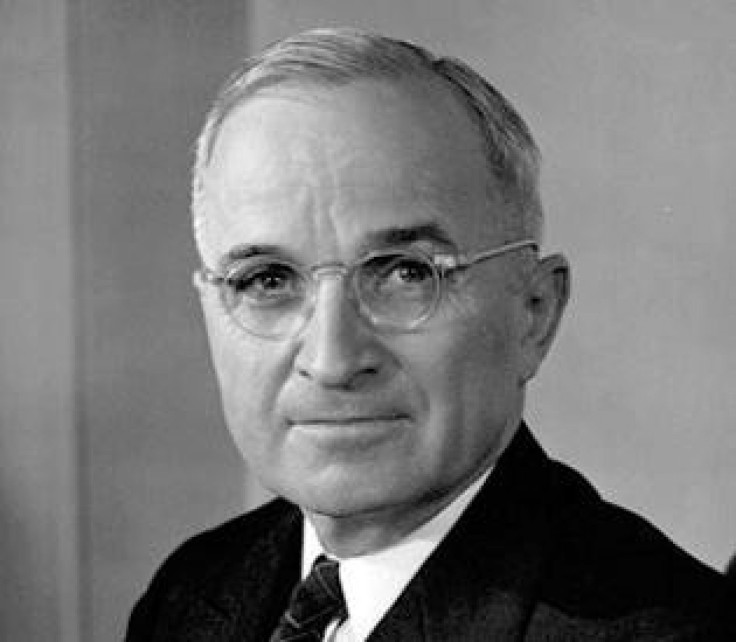What Would Harry Truman Do to Solve the Debt Crisis?
Analysis

"Harry Truman" (1975) by the rock group Chicago
America needs you
Harry Truman
Harry could you please come home?
Things are looking bad
I know you would be mad
To see what kind of men
Prevail upon the land you love.
We'd love to hear you speak your mind
In plain and simple ways
Call a spade a spade
Like you did back in the day
You would play piano
Each morning walk a mile
Speak of what was going down
With honesty and style.
--
Could the United States use some leadership now? You bet. Two weeks of mind-numbing rhetoric by both major political parties. A Tea Party faction that seemingly has only three objectives: say no, obstruct, and implement sorched Earth-like plans. And a public that's more interested in summer time pursuits than making their interests known to Congress.
Add it up and the toss in perhaps the most important issue of the initial decades of the globalization era and you have the makings of a fiasco on the Potomac -- and one that could literally damage the incomes of tens of millions of senior citizens, among other horrible consequences.
The debt deal impasse, as many Americans sense, is highlighting a crisis of leadership.
Typically, during leadership lapses, the focus is on the White House, but in this brewing travesty, there is enough blame to go around, and much of it lies at the other end of Pennsylvania Avenue, on Capitol Hill.
Congressional leadership -- House and Senate -- and on both sides of the aisle -- has been abysmal.
House Speaker John Boehner, R-Ohio, is the personification of this rudderlessness on Capitol Hill.
Boehner, after helping to fan the flames of ultra-conservatism in the Tea Party faction -- and benefiting from its votes during his 2010 re-election- - in now standing there as the Tea Party comes forward with its "IOUs."
So far, the Tea Party has not shown even the slightest interest in compromise. It is against raising taxes. It is against tax reform that eliminates loop-holes. It wants federal spending cut by a massive amount, regardless of the impact of those cuts on senior citizens, children, and the other most vulnerable members of society. And most tragic, it is against raising the debt ceiling -- a stance that could trigger a financial system-jarring, economy-weakening U.S. Government default.
As a result of the above, Boehner's debt reduction bill -- which would have cut government spending by more than $1 trillion -- had to be withdrawn because too many Tea Party members would have voted against it, defeating it in a Republican-led house.
If Boehner is able to lead and forge a new deal with House Republicans -- perhaps by adding 30 or 40 House Democrats to his coalition -- he will have shown some semblance of national stewardship. Unfortunately, there's little empirical evidence to suggest he will be able to do this.
Meanwhile, at the other end of Pennsylvania Avenue, President Barack Obama is facing growing criticism from the liberal wing of his party that he's standing up less and less for core Democratic interests as his presidency continues.
To-date, many liberal Democrats argues, Obama has made sacrifices on core Democratic interests, and received little in return from the Republican Party.
He allowed the 2001 and 2003 Bush tax cuts on the wealthy/upper income groups to be extended and got very little in return. He's willing to agree to cutbacks in Medicare and Medicaid, and received nothing from the GOP. He even said he'll allow a revision of Social Security's payout formula -- a change considered to be heresy in certain Democratic circles -- and he received zip, zilch, nada from Republicans.
A running joke in Democratic circles inside the beltway is "Encyclopedia entry: In 2008, the nation elected a Democratic president. Response: How can you tell?"
**
In a sense, in Washington, what we have now is what former President Harry Truman said about the 1946-48 Republican-led Congress -- it's "a do-nothing" Congress. Or at least a do-nothing U.S. House.
And at the other end of Pennsylvania Avenue, the nation has a registered Democrat who really has not been that Democratic. If Truman was president, and the GOP proposed weakening Social Security, he'd call them out every day, and tell senior citizens what the Republicans plan to do to lower your standard of living in your golden years, and how it would push future seniors in to poverty.
--
America's calling
Harry Truman.
Harry you know what to do.
The world is turnin' round
And losin' lots of ground
So Harry is there something we can do to save the land we love?
© Copyright IBTimes 2024. All rights reserved.











